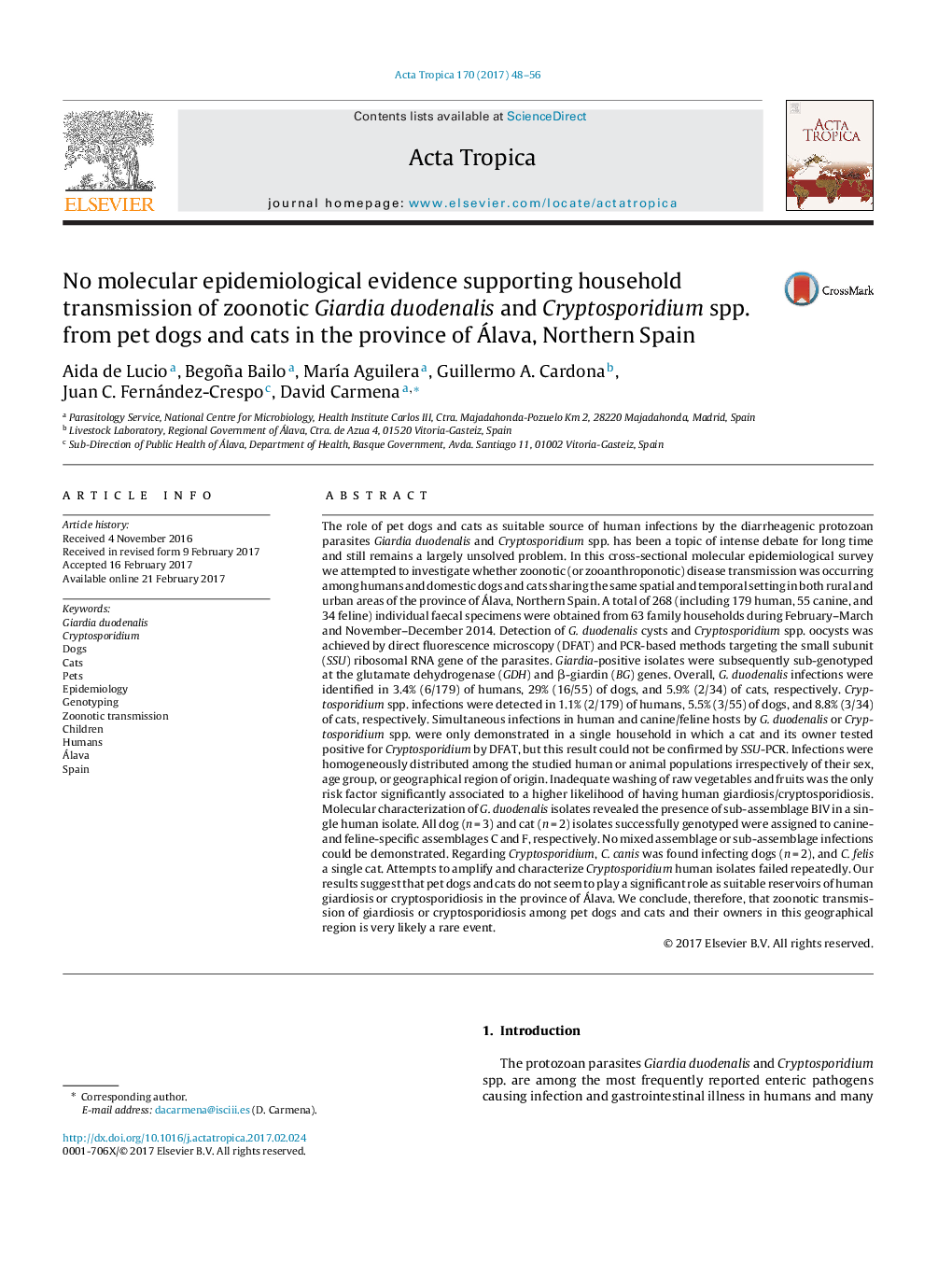| کد مقاله | کد نشریه | سال انتشار | مقاله انگلیسی | نسخه تمام متن |
|---|---|---|---|---|
| 5670791 | 1592754 | 2017 | 9 صفحه PDF | دانلود رایگان |

- Giardia duodenalis and Cryptosporidium spp. were relatively common in humans, dogs, and cats sharing the same household.
- No molecular epidemiological evidence supporting the occurrence of zoonotic (or zooanthroponotic) disease was found.
- Zoonotic transmission of giardiasis or cryptosporidiosis among pet dogs and cats and immunocompetent humans seems a rare event.
- The extent of these findings should be confirmed in future studies involving larger sample panels.
The role of pet dogs and cats as suitable source of human infections by the diarrheagenic protozoan parasites Giardia duodenalis and Cryptosporidium spp. has been a topic of intense debate for long time and still remains a largely unsolved problem. In this cross-sectional molecular epidemiological survey we attempted to investigate whether zoonotic (or zooanthroponotic) disease transmission was occurring among humans and domestic dogs and cats sharing the same spatial and temporal setting in both rural and urban areas of the province of Álava, Northern Spain. A total of 268 (including 179 human, 55 canine, and 34 feline) individual faecal specimens were obtained from 63 family households during February-March and November-December 2014. Detection of G. duodenalis cysts and Cryptosporidium spp. oocysts was achieved by direct fluorescence microscopy (DFAT) and PCR-based methods targeting the small subunit (SSU) ribosomal RNA gene of the parasites. Giardia-positive isolates were subsequently sub-genotyped at the glutamate dehydrogenase (GDH) and β-giardin (BG) genes. Overall, G. duodenalis infections were identified in 3.4% (6/179) of humans, 29% (16/55) of dogs, and 5.9% (2/34) of cats, respectively. Cryptosporidium spp. infections were detected in 1.1% (2/179) of humans, 5.5% (3/55) of dogs, and 8.8% (3/34) of cats, respectively. Simultaneous infections in human and canine/feline hosts by G. duodenalis or Cryptosporidium spp. were only demonstrated in a single household in which a cat and its owner tested positive for Cryptosporidium by DFAT, but this result could not be confirmed by SSU-PCR. Infections were homogeneously distributed among the studied human or animal populations irrespectively of their sex, age group, or geographical region of origin. Inadequate washing of raw vegetables and fruits was the only risk factor significantly associated to a higher likelihood of having human giardiosis/cryptosporidiosis. Molecular characterization of G. duodenalis isolates revealed the presence of sub-assemblage BIV in a single human isolate. All dog (n = 3) and cat (n = 2) isolates successfully genotyped were assigned to canine- and feline-specific assemblages C and F, respectively. No mixed assemblage or sub-assemblage infections could be demonstrated. Regarding Cryptosporidium, C. canis was found infecting dogs (n = 2), and C. felis a single cat. Attempts to amplify and characterize Cryptosporidium human isolates failed repeatedly. Our results suggest that pet dogs and cats do not seem to play a significant role as suitable reservoirs of human giardiosis or cryptosporidiosis in the province of Álava. We conclude, therefore, that zoonotic transmission of giardiosis or cryptosporidiosis among pet dogs and cats and their owners in this geographical region is very likely a rare event.
107
Journal: Acta Tropica - Volume 170, June 2017, Pages 48-56